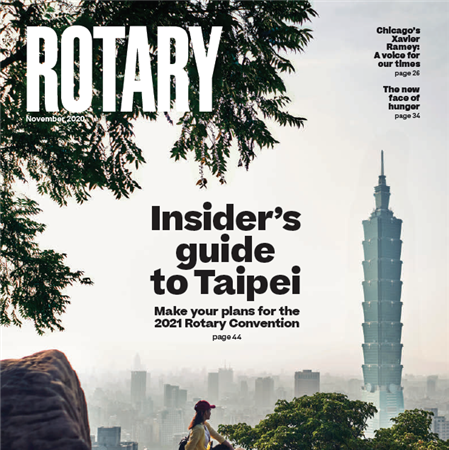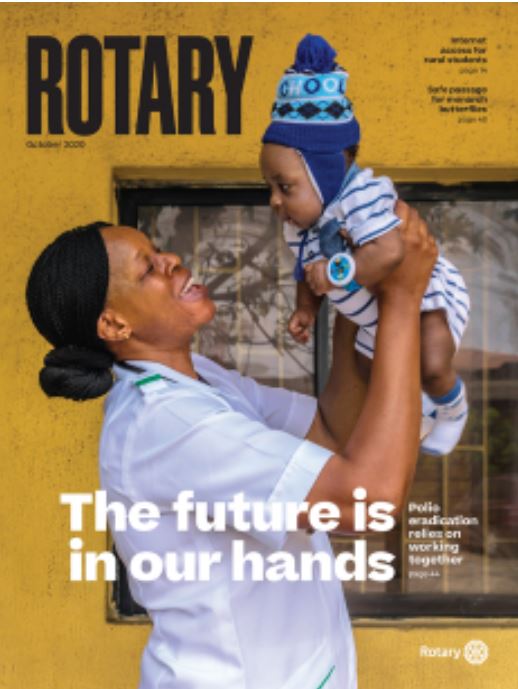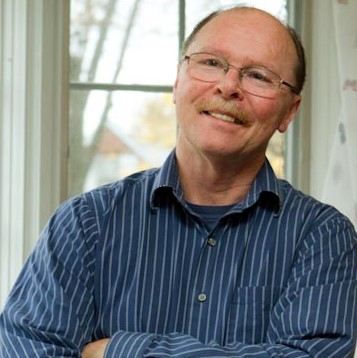
Paul Engleman is a Chicago-based freelance writer who is a frequent contributor to the Rotary magazine and Contributing Editor for Rotary Canada magazine. He is also an award-winning novelist whose articles, essays, and interviews have appeared in many publications, including the New York Times and Playboy. Paul is a polio survivor.
 From its beginnings as a 12-page periodical, Rotarian has grown into an award-winning publication with a circulation of over 500,000, inspiring the creation of a host of Rotary regional magazines.
From its beginnings as a 12-page periodical, Rotarian has grown into an award-winning publication with a circulation of over 500,000, inspiring the creation of a host of Rotary regional magazines.More than half of Rotarians worldwide receive a regional magazine instead of The Rotarian. The Rotary World Magazine Press publishes more than 30 officially licensed Rotary regional magazines. These publications are produced independently by Rotarians, distributed in more than 130 countries, and published in more than 20 languages.
What it’s like to survive through two pandemics, excerpt from Rotary magazine, September 2020
By Paul Engleman
By Paul Engleman
Sixty-five years ago, in 1955, I was diagnosed with polio. I was two years old, so I was unaware of what it meant to have been infected with the poliovirus, but I became more aware of it in subtle ways as I got older. And at some point, I understood what my mother meant when she said I was “one of the lucky ones.”
My mother came from Jersey City, New Jersey, and she sounded like it all her life, aided and abetted by a daily regimen of unfiltered  Kool cigarettes. She drove a supply truck as a civilian during World War II and delighted in telling a tale about a GI who tried to “get fresh” with her when she gave him a lift back to the base. When she told him she was married and her husband was deployed overseas, he said, “Baby, what’re you saving it for — the worms?”
Kool cigarettes. She drove a supply truck as a civilian during World War II and delighted in telling a tale about a GI who tried to “get fresh” with her when she gave him a lift back to the base. When she told him she was married and her husband was deployed overseas, he said, “Baby, what’re you saving it for — the worms?”
 Kool cigarettes. She drove a supply truck as a civilian during World War II and delighted in telling a tale about a GI who tried to “get fresh” with her when she gave him a lift back to the base. When she told him she was married and her husband was deployed overseas, he said, “Baby, what’re you saving it for — the worms?”
Kool cigarettes. She drove a supply truck as a civilian during World War II and delighted in telling a tale about a GI who tried to “get fresh” with her when she gave him a lift back to the base. When she told him she was married and her husband was deployed overseas, he said, “Baby, what’re you saving it for — the worms?”Deep into water, excerpt from Rotary Canada magazine, October 2012
by Paul Engleman
As a child growing up in Montreal, Ryan Rowe resented his parents’ requirement that he learn a second language. “I hated having to learn French,” says the 2010-12 Rotary Peace Fellow, who earned a master’s degree in public health from the University of North Carolina at Chapel Hill in May, along with a certificate in peace and conflict resolution. “I never expected that I would come to love learning new languages.”
Rowe, 34, now speaks Spanish and Portuguese in addition to English and French, and he’s recently taken up Mandarin Chinese. Learning new languages is something Rowe does as a hobby. His official line of work – the stuff he’s really serious about – is water and sanitation. That was his specialty at UNC, where he studied at the internationally acclaimed Water Institute. Today he is a part-time communications officer at the institute and quenches his thirst for volunteer opportunities on water projects in Africa, with Rotary and other organizations.
“A lot of people think the water crisis is just too daunting,” he says. “I believe if we work together and remain committed to investing our energy, our skills, and our money, we can have a positive impact.”